East Africa’s largest container port is scheduled to be built off the Kenyan coast as part of a regional transport corridor meant to open up the region’s landlocked countries to international trade.
But with the enormous port’s construction just a few kilometers away, residents of the small island of Lamu – a World Heritage site – residents fear their delicate ecosystem, their livelihoods and their ancient way of life are all about to be lost.
UNESCO declared Lamu's Old Town a World Heritage site as "the oldest and best preserved Swahili settlement in East Africa." Its coral stone streets, traditional fishing methods and society have been largely unchanged for centuries. Wooden fishing dhows crowd together in the small harbor, and donkeys, not cars, provide island transport.
Some scholars have called the island, inhabited for over 700 years, the cradle of Swahili civilization.
"We were civilized for a long time. Arab dhows, Indians, Europeans used to come to Lamu to trade," said Abubakar El-Amudy, an islander in his 60s.
"Because we are able to preserve the cultural heritage from generation to generation, you can see the built heritage, the traditions, the culture. They are different because it has been isolated, marginalized, for quite a long time."
Change coming
But all that is about to change with the container port’s construction, said El-Amudy, who runs a coalition of organizations called Save Lamu.
The threat to the island is real, he said. "It will become a modern city where there will be an influx of people, and therefore definitely that will change everything."
Expanding transit options
The port is part of a planned corridor called LAPSSET, which stands for Lamu Port and South Sudan Ethiopia Transport. It also will include a railway and oil pipeline, an oil refinery and two new airports.
Kenyan authorities say the corridor will be a game-changer for East Africa, opening up trade for Kenya’s landlocked neighbors, as well as the country’s own northern region. It will mean new investment, they say, and jobs.
But El-Amudy is afraid most jobs will go newcomers, not to Lamu’s resident fishermen. Fishing is Lamu’s most important industry. But with the waterways in and out of the estuary soon to be clogged by ships, the islanders are set to lose access to their main fishing grounds.
Vae Buno Vae, who comes from a long line of Lamu fishermen, has been plying the waters himself for 35 years. He is convinced that, once the port is built, there will be nothing left for fishermen.
Their small boats cannot handle the rough open sea, so without the estuary, fishing as a livelihood will die, he said. While a landowner could be compensated with more land, he added, fishermen like him cannot be given another sea.
Environmental aspects
Because Lamu is surrounded by delicate coral reefs and mangrove swamps, there are environmental concerns as well.
Vae said fish feed and breed in the coral and mangroves, whose wood has been used for centuries to build boats and houses. But dredging is fast destroying the coral reefs, he said. As for the mangroves, hectares have already been cleared, and this is just the beginning.
El-Amudy fears a noisy, dirty port will also drive away Lamu’s other main source of income: tourists.
"With the pollution and lots of people, tourists might decide not to come," he said. "We have wildlife here, we have sights and monuments. So if this were destroyed, definitely what will the tourists come to see? And the beaches, which are very attractive, will be destroyed, definitely."
The details may be hazy, but almost everyone agrees that Lamu will be very different once the corridor is complete. For now, the mood on the island is one of profound pessimism.
At 57, Vae says his own working life is nearly over. But he is worried about what will happen to his children and grandchildren, and what they will be losing. Through fishing, Lamu has always provided for its people, even those who cannot find jobs, he said. It may not do so much longer.
A few fishermen cannot stop a juggernaut like LAPSSET, Vae said. He added, the only thing to do is wait to see whether the Lamu he and his ancestors have known will indeed become a thing of the past.












